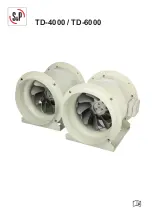
10
FAN PREPARATION
PERMA•LOCK™ HARDWARE AND TOOLS NEEDED
(not to scale)
Prepare for fan installation as follows:
Step 4a.
Remove the paper shield (Figure #1) from
the motor.
Step 4b.
Locate the Set Screw as shown in Figures
#2 and #3. If the end of the Set Screw can be seen
within the motor coupling as shown in Figure #3, you
will need to unscrew the Set Screw so that the tip
of the Set Screw does not remain in the path of the
downrod.
Step 4c.
Slide the pole cover on to the downrod, then
route the wires through the 5" Perma•Lock downrod
and ball assembly as shown in Figures #2 and #4.
Insert the downrod into the motor coupling and turn it
clockwise until it stops turning as shown in Figure #4,
ensuring that the downrod has bottomed out.
TIP:
The downrod has a tapered thread as shown in
Figure #4 that is designed to lock completely when
installed correctly.
Step 4d.
Tighten the Set Screw with the Allen wrench
as shown in Figure #4 to ensure safe operation of your
fan. If it is tight enough, you should not be able to turn
the downrod counterclockwise with your hands. If in
doubt, tighten the Set Screw with the Allen wrench
until you cannot turn it any further.
5"Perma•Lock™ Downrod
and Ball Assembly
Set Screw
Allen Wrench
CAUTION: Failure to fully screw in the
downrod all the way into the motor coupling
may cause the fan to separate from the
downrod and fall during normal operation.
IMPORTANT SAFETY INFORMATION:
Before starting the installation of your
ceiling fan, install the threaded downrod into
the motor coupling and lock the assembly.
PAPER MOTOR
SHIELD
Figure #1
TAPERED
THREAD
SET SCREW
SET SCREW
ALLEN
WRENCH
ALLEN
WRENCH
TIP OF SET SCREW
MOTOR WIRES
(LEAVE AT LEAST
6" LONG)
PERMA•LOCK™
DOWNROD AND
BALL ASSEMBLY
PERMA•LOCK™
DOWNROD AND
BALL ASSEMBLY
MOTOR
COUPLING
MOTOR
HOUSING
ASSEMBLY
Figure #2
Figure #3
Figure #4
POLE COVER
Pole Cover






































